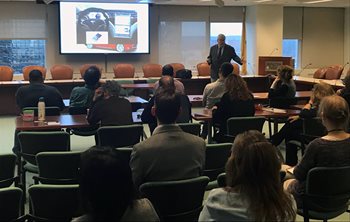 Automated vehicles will prompt a “seismic shift” in American society comparable to what occurred with the advent of the smart phone, says Mitchell Erickson, consultant and retired science advisor, U.S. Dept. of Homeland Security. Once in common use, they will forever alter our lifestyles and the physical layout of our communities, he predicts.
Automated vehicles will prompt a “seismic shift” in American society comparable to what occurred with the advent of the smart phone, says Mitchell Erickson, consultant and retired science advisor, U.S. Dept. of Homeland Security. Once in common use, they will forever alter our lifestyles and the physical layout of our communities, he predicts.
Erickson offered his insights in a briefing to NJTPA staff titled “Mobility in 2050: Who Knows? How to Prepare for the Unknown” on March 30. He said there will be winners and losers in the transition to automated vehicles. Travelers will benefit from increased mobility options and dramatic increases in safety -- with traffic deaths reduced by as much as 90 percent. But many of those involved in our current car culture, including Uber and Lyft drivers, could lose their jobs.
The pace of the deployment of automated vehicles will depend on companies’ ability to make them efficient, trusted, hackproof and accepted by consumers, he said. “There are huge uncertainties in our future.” he said. Transportation agencies such as the NJTPA must be “willing to plan for contingencies,” he advised.
Declining demand for private automobiles, he predicted, could one day dramatically alter housing arrangements and land use, including eliminating the need for garages, roadside gas stations and much parking. In suburban areas, he said, as much of 20 percent of land area is used for parking. “What do we use all that space for?” he asked.
Instead of offering free parking or coupons to draw customers, he envisioned, retail outlets, could offer automated vehicle trips to and from people’s homes. If deployed efficiently, the vehicles could help reduce greenhouse gas emissions, 26 percent of which currently come from the transportation sector.
At the same time, he said, his background in Homeland Security made him aware of potential threats such as use of automated vehicles, drones and other systems for terrorist or criminal activities.
He said while change is coming to the transportation sector “big time,” transportation agencies like the NJTPA have a “chance to shape that future” through current plans and programs.